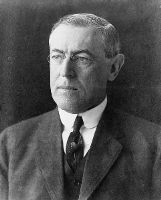
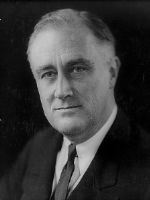
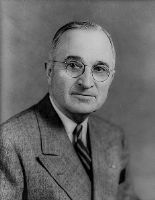
As we have recently seen, however, especially after the terrorism of 9/11/01, he has become for a majority the symbol of continuity and reassurance in times of national crisis, and so, both for this and other reasons, Bush has, despite being the popular vote underdog in 2000, won his second four years in the White House, in the process also making history.
But President Bush clearly relishes large challenges. Now he has perhaps an even greater one ahead. Having joined the minority of American presidents who have had "four more years" added to their resumes, his "mission impossible" (now that he has chosen to accept it) is to get through that period without such misadventures as have plagued all modern two-term presidencies.
I am certainly not arguing that all recent presidents have been abject failures in their second terms. However the record seems to show that, with the political atmosphere, divergent national threats, economic dilemmas, and other issues as complex as they are now, it is quite difficult for presidents today to get through those extra four without significant personal and/or leadership problems that typically reflect so badly on their second administrations as to overshadow the positive things they may have done then. Usually a somewhat disgraced second term has also wound up being the prelude to the main opposition party's retaking the White House in the next presidential election.



In his second term after World War I, Woodrow Wilson, who attempted to make policy out of an ideological sense of mission and came up with the idea, ahead of its time, of a League of Nations (the forerunner to the later, more successful United Nations), was shocked and outraged when, though Europe endorsed the new organization, his own Congress refused to ratify it, the debates sparking bitter partisan divisions. When it became clear he would not be successful in this dream, Wilson's health declined, and he suffered so massive a stroke that he could not speak and was bedridden much of the time. His second wife, Edith Wilson, with the acquiescence and conspiracy of the President's doctors, essentially ran the presidency until the end of the new term, claiming to consult the President in his bedroom, but really just making the decisions herself.
In the 1930s, Franklin D. Roosevelt had by most accounts a terrific first term, essentially turning our country around from the nosedive it had been in with the Great Depression, getting people gradually back to work, reestablishing credit, supporting the banks and securities markets, providing for large needed infrastructure projects, rebuilding confidence, and so on.
But in his second term he had major political defeats after assuming, in error as it turned out, that he had a large mandate to expand his New Deal approaches even if through questionable means, including packing an enlarged Supreme Court with judges picked to support his policies. In this FDR was soundly and correctly rebuffed.
If not for the increasing turmoil in Europe at the time and the ongoing effects in this country of the economic depression (a calamity for many comparable to our country being at war), FDR likely would not have been reelected again. Indeed, in the mid-term elections, his party failed to win enough new seats in Congress to allow him to make much more headway in his ambitious New Deal programs.
His successor, and former Vice-President, Harry Truman, took over the White House upon FDR's death in 1945. In 1948, Truman had a surprise victory. But his second term was seriously problematic, and he was chastised for a series of reverses in war on the Korean Peninsula, firing popular General Douglas MacArthur, allegedly being soft on Communism in the early Cold War years, and even, during the Senator Joseph McCarthy era, for corruption and Communist infiltration of his administration.
It was then with optimism and relief that the country elected smiling "Ike" in 1952. This popular former General and then President, Dwight D. Eisenhower, in his first term successfully got us out of war in Korea, if not with a win at least with a draw and without significant further costly engagement with mainland China.
But, in Ike's second term, there were big concerns over his effectiveness following heart attacks, new Cold War crises, and the successful launch of Soviet satellites, especially the 1957 Sputnik, beating us into space. These developments shocked US voters, appearing to show we were now far behind the Communists in military capability and technology.
The climax of bad news for President Eisenhower came as his efforts to negotiate with the Soviets for mutual disarmament and control of nuclear weapons were embarrassingly ended in 1960, months before the next election, when US U-2 spy plane over-flights of the USSR, which Ike had both personally approved and yet publicly denied, were revealed to the world by the Soviets, after they had brought down one of the aircraft along with its pilot, Gary Powers, who from prison in Russia was recorded and broadcast admitting America's involvement in the espionage and in violating USSR airspace. With hindsight, the incident might have been avoided. By then spy satellites were beginning to provide us with new intelligence on our enemies that would soon supercede what was available through the U-2 cameras.
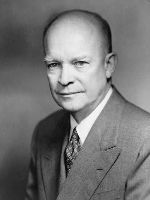
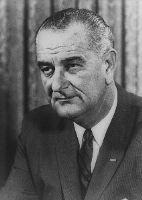
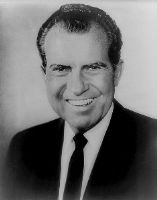
Following the humiliating U-2 revelations, disarmament would be stalled and then put on hold for well over a decade, John F. Kennedy would successfully argue that Eisenhower's choice for his successor, Richard M. Nixon, lacked the right stuff to lead the free world against the Soviet menace, and a huge arms race would ensue, leading to both the USSR and the US developing and deploying tens of thousands of nuclear ICBMs.
Lyndon Johnson was Vice-President when JFK was assassinated in 11/63, and so became President at that time. Previously a brilliant legislator himself, he knew how to get what he wanted out of Congress and pushed through landmark Medicare, Civil Rights, and "war on poverty" legislation. Elected in 1964, his second term, though, was marked by the greatly controversial and ultimately failed war in Vietnam for which he was blamed. Amid extremes of political unrest, division within his party, racial violence, and police brutality, he declined to run for President in 1968, and Republican Richard Nixon defeated Hubert Humphrey for the new presidency.
Nixon was overwhelmingly reelected in 1972, seemingly with a huge mandate to get his goals accomplished. But his attempted cover-up of the Watergate break-in and an overall campaign of dirty tricks against the Democrats led to credible threats of impeachment and to his resignation, in 1974.
Gerald Ford, Nixon's Vice-President, quickly pardoned his predecessor (an unpopular decision) and merely served out the balance of what would have been President Nixon's second term, but in 1976 the electorate replaced him with Democratic President Jimmy Carter who appealed to voters with his churchgoing ways and strict moral purity. For him, that appeal wore off quickly, though, and in 1980, offering an upbeat assessment of American strength and values, the well known actor, Republican Ronald Reagan, entered the Oval Office after winning by a landslide.
Although he was still popular and would be known as well for being President when the Soviet Union collapsed, Reagan's second term was substantially undermined by the Iran-contra scandal, in which the executive branch sought to cover up its support of Nicaraguan contra rebels (terrorists in today's terminology) who were fighting a guerrilla war against the Nicaraguan government then in power.
In addition, against the wishes and legislation of Congress, the President's people were funding this clandestine Nicaraguan operation by secretly selling arms to Iran, despite an embargo on such trading with that country (following its taking and holding as hostages scores of our Iranian embassy personnel in the late 1970s, and its insurgency groups' kidnapping of more of our people, in Lebanon, subsequently).
Though top level people in Reagan's administration, including then Vice President George H. W. Bush and President Reagan himself, were implicated in the scandal, there was no proof of their involvement other than the testimony of operative commander LTC Oliver North. Reagan, perhaps already afflicted with early Alzheimer's disease, to question after question about the affair, just repeated that he could not remember. Doubts about his and Vice President Bush's veracity persisted, however, and the incident left unresolved major issues about the respective limits of executive vs. legislative powers, that arguably weakened both the presidency and Congress, while also adding to the climate of partisan conflict in which the nation has been increasingly mired at least since the Watergate period.
As with Wilson's second term, there is evidence too that the President's second wife, Nancy Reagan, was a significant factor in the Presidency during Reagan's last four years. She claimed to be simply protecting him from intrusive critics and the media, but apparently also was at least his confidant and consultant in matters of policy in those later years. She, in turn, would check with an astrologer for guidance in what would be the best course of action on key decisions.
Democratic President Clinton's second term, of course, was most notorious for the Monika Lewinsky scandal, along with lies and other indiscretions, which led to his being impeached. It is ironic that his personal life became so problematic that it made him politically and legally liable. Otherwise, he might have been regarded as a quite able President who accomplished much despite, most of his time in office, needing to deal with a Republican-controlled Congress.
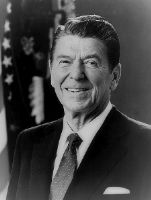
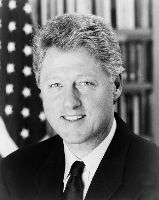
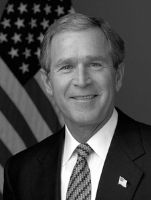
Indeed, a persistent pattern during modern US presidencies is that the opposition gains significantly in both the House and Senate during the midterm elections, particularly in second terms, making further constructive legislation or judicial appointments rather difficult.
This pattern may not prove true in 2006 but, if not, it will be another major coup, and an ongoing demonstration of resiliency, for President George W. Bush and his party.
Does this President have what it takes to overcome the odds yet again? Can he, alone among modern presidents, complete a new term unscathed by scandal or major political or personal defeats?
As he begins his second four years, the difficulties do not seem small. Although I am an Independent and did not vote for this President, because the stakes for our country are now so high (from the risks of a greatly ballooning federal deficit, to the potential for constitutional crises, loss of personal rights and freedoms, mass demonstrations and unrest in our cities, the possible emergence of a fundamentalist Islamic state or civil war in Iraq, ongoing violence in and around Israel, the overthrow of Arab and Islamic governments with which we have had long ties, hazards of increased inflation and dollar devaluation, threats from changes accompanying global warming, underfunding of Social Security and Medicare, possible terrorism or nuclear warfare, negative surprise factors, and so on), I hope Bush does not need to suffer the kind of reverses experienced by other second term Presidents.
So long as he stays within the confines of a conservative interpretation of the U.S. Constitution, it is in all our interests that he is successful and breaks the rule that a President's second four years are marked by dramatic failures and disappointments.
If he manages to avoid the fates of his predecessors elected to four more years, Bush could deserve credit and the laudatory legacy he undoubtedly seeks. He would then certainly leave "a large footprint," one perhaps rivaling that of Franklin D. Roosevelt among the modern presidencies. But if, like so many in the Oval Office before, President Bush comes up rather short in his second term, the repercussions for the nation could be traumatic. Let us fervently hope we do not go there.
Sources: Infoplease: Iran-contra Affair; and "Bill Clinton's Second Term Blues" by Bill Schneider/CNN